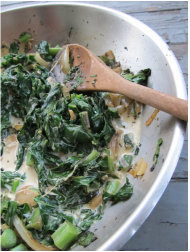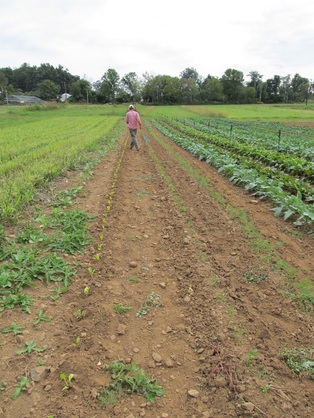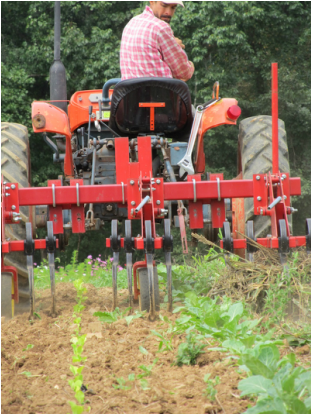|
(Courage, Callouses, Kale) "Cultivation is dirty work. It entails everyday patience and impatience, care and carelessness, conversation, gesture, housecleaning, grocery shopping, taking out the trash, pulling weeds, making dinner, putting kids to bed, trying to listen to a friend when you don’t really have it in you, attending to the pain of a loved one. All in all, cultivation is a process of commitment. It involves all the quotidian obligations and routines that require thought at its lower register, often draining thought and frustrating the illusions of a higher ambition, in the hope and sense that this gesture or that chore is what needs to be done now if things are to be made right later. … It is difficult to imagine cultivation proceeding if there is not a passion for it and the things that may grow out of it—friendships, poems, families, food, and tropes, children, students, a confounded and complicated set of connections and disconnections, playing across all manner of talk and action." from Thomas L. Dumm The Politics of the Ordinary Sometimes movement is imperceptible to the naked eye, or the naked mind, but still happening. Sometimes faith is hidden beneath a frantic and uninvited cloud of work and worry, but still a flame within. The glints of autumn have been emerging out of corners of days for some time now, threading through late summer much earlier than expected. It was riding out to harvest in the back of the pick-up truck sometime in early August when I first voiced, between a question and a statement: the air almost feels like And someone else completed the thought fall. But now, after one of the most stifling hot can’t-drink-enough-water-to-stay-hydrated summer days on Wednesday—a last taste of heat purging our bodies of any remaining toxins, that familiar, nostalgic, and buoyant coolness has surfaced as a simple reminder of what is to come and what is already here. Cold air in conjunction with warm sun. Sleeping weather. Eating weather. Working weather. Cold feet at night, thermoses of hot soups at lunch, storage crops moving from under dirt into cellars and barns, to harden skins and sweeten fruit, to cure and wait. Planning for the future evolution of a farm, of this farm, the flesh of which does not exist, (or at least not in the form of a signed lease and a team of equines whose lines are in my calloused hands) is a practice of faith: faith in limbo and in the end of limbo, faith in the imperceptible movements. It is a meditation on the infinitesimal gestures we present into the great abyss, through works of pleasure, perseverance, and any unarticulated measures necessary to avoid the uninvited clouds of pessimism, cynicism, or doubt. With courage we maintain momentum, and invite the work of cultivation, the work of the minute. Fall: the sun relates to us at a different angle, the green leafy plants hold a different tenderness, sweetness, softness, and, despite the implications of the name, we are lifted into familiar realms of inner and outer work: another school year, a return to routine, a guarantee that the qualms and imperfections, the disasters and inclemencies, of this year will trope and turn, and give way to something: else. A resting, a dormancy, a hibernation, and a newness. We disc the dying vines, seed in the cover crops of rye and vetch and oats, begin to put the farm to bed—all the gestures and chores which need to be done now in order to make things right later. The work of our lives falls into place, so we may later spring into newness. It seems perfectly comprehensible that what we so often chose to believe and name as stagnancy, is but a series of intentions and events—conversations, emails, hopes, thoughts, meetings, documents, dreams, and plans—which later come together to manifest themselves as something altogether alive and moving: a business, a home, a farm. I am redrawn into the work of farming each day by the presence of the tangible--the manifestations of my work, and the earth's work, present to be held and smelled, tasted and known; but it is the many small and intangible gestures (of patience and impatience, of care and carelessness) which together bring the seed to germination, the fruit to ripening, the meal to being prepared, digested, and decomposed. It is to the secret and faith-filled work of these tasks to which we commit ourselves. When we most fail to notice the fruits of what our cultivations will produce, we are granted opportunities to clothe the eye and mind in new metaphorical garments, allowing the imperceptible movements to be perceived, and thus celebrated. Sincerely Yours, Lisa and Anton  Everyday Kale Sauté Okay, this isn't just a cute rhyming-title. I actually have gone weeks this spring and late-summer where I eat this every night for dinner. Prepared in 23 minutes or less, over a bed of reheated millet or brown rice, this is pretty much what I consider a gourmet meal. I doubt you'll be disappointed. Especially if you don't skimp on the heavy cream. Ingredients: 2-3 T olive oil or butter or ghee 1 medium onion or shallot, chopped fine 2 or more cloves of garlic, minced herbs, fresh or dried, in abundance (at least a full T of dried herbs, or at least 2-3 T of fresh herbs): oregano, thyme, herbs de province, sorrel, parsley, basil... choose your own adventure black pepper, coarsely ground, and sea salt a splash of your favorite hot sauce or a pinch of red pepper flakes, (optional, but recommended) a pile of kale or other leafy greens (broccoli raab, arugula, spinach, chard, collards), washed and chopped--if you're using stems, chop fine and set aside; leaves can be ripped or chopped into chewable portions a dash of balsamic vinegar 2-3 T of crumbled blue cheese or other soft cheese (goat chevron and brie/ camembert style cheeses work well) (optional) a healthy splash of heavy cream (real, and good quality. I recommend Seven Stars or Natural by Nature, unless you have a cow yourself.) ume plum vinegar to taste (available in most health food stores, this salty fermented raw vinegar makes any vegetable, meat, or grain dish a little more divine) The how-to: (1) in a saucepan or caste iron pan with a lid, heat butter/ ghee/ oil on medium heat. Add chopped onion, salt, and black pepper. Continue stirring until onion browns and softens, a few minutes. (2) reduce heat. add herbs and hot sauce/ red pepper. add stems of greens. add minced garlic. (3) when herbs are fragrant and stems begin to soften, increase heat to medium and add greens. If pan is starting to brown, add a tablespoon of water and put the lid on for 1-2 minutes. Stir. Repeat if needed, careful not to add too much water. (4) when greens are tender and cooked down, and water is gone, add balsamic and let sizzle. add cheese if using. stir once, cover with lid, and off heat. add cream. add ume plum vinegar. eat immediately.
2 Comments
10/12/2019 05:24:24 pm
They say that if you got t the chance to spend a life in a farm, you will learn a lot of life lessons. Not just the lessons you should know on how to live in a farm, but more essential attitude a person must possess in order to be a productive yet a good person. It is truer that small gestures can go a long way, that's why we should make sure that we let other people feel special through our own gestures. I am sure that's going to be a huge help and boost for their self-confidence.
Reply
Leave a Reply. |
Archives
December 2019
FarmersAnton M. Shannon Categories
All
|



 RSS Feed
RSS Feed